Every New Year’s Day, near the end of the college football season, fans pile into Raymond James Stadium to watch one last game. It’s significant for the Southeastern Conference and Big Ten Conference teams and their fans, to be sure, but something often missed is the economic impact the event has for the Tampa Bay area—including, but not limited to, vendors, transportation businesses and the branding of a region.
“Both conferences are loaded with tradition-rich, high-profile teams that want to play a postseason game on New Year’s Day in Florida at a spectacularly attractive destination like the Tampa Bay area,” says Jim McVay, who has been president and CEO of the Outback Bowl for 30 years.
The teams, many from northern states such as Iowa and Michigan State, are thrilled to flee to the sunny, warm climate and escape their brutal winters. The event is more than one game—it’s a weeklong, first-hand-experience commercial for the Tampa Bay area and the money they spend funnels right back into the local economy.
 “The teams from the Big Ten tell us, ‘We know we’re supposed to be trying to get into the Sugar Bowl or the Rose Bowl,’ but they want to come here,” McVay says.
“The teams from the Big Ten tell us, ‘We know we’re supposed to be trying to get into the Sugar Bowl or the Rose Bowl,’ but they want to come here,” McVay says.
McVay says the game’s $1 billion economic impact since the beginning is only a conservative estimate.
The Outback Bowl contracts with the Big Ten and SEC to get top-tier selections from conferences—attractive teams that are great “travelers” (that is, have large fan bases willing to travel to see their team play)—but attracting those kinds of teams takes a substantial investment from the Outback Bowl.
“We pay a lot of money to the schools. People sometimes forget that. We’ve paid the universities $149 million. You have to pay the conferences for them to send the schools,” McVay says. “The football teams come, and who follows? The fans. The Outback Bowl takes a huge financial risk, paying the schools a lot of money, and the fans come pouring into the Tampa Bay area. Who do you think is the big winner every year? The hospitality community”—hotels, restaurants, nightclubs, car rental agencies, attractions and others.
“To have that piece of business at the end of December and the beginning of January is baked-in great business,” says Santiago Corrada, president and CEO of Visit Tampa Bay, the city’s tourism group. “It ends the year on a high note and starts the year on a high note for these businesses.”
The people coming into town are still in the holiday spirit and looking forward to celebrating their teams in warmer weather.
“The people who follow their teams are always in a good mood,” McVay says. “They get to come to Florida so they make a vacation out of it.”
 It’s not just the fans who get to experience all that Tampa Bay has to offer. It’s also the coaches, team staff, players, cheerleaders and band members, who all experience a week full of events, including trips to Busch Gardens, Clearwater Beach and Ybor City.
It’s not just the fans who get to experience all that Tampa Bay has to offer. It’s also the coaches, team staff, players, cheerleaders and band members, who all experience a week full of events, including trips to Busch Gardens, Clearwater Beach and Ybor City.
“The Outback team knows how to do it and how to do it right, for the teams, media, fans, coaches … and the TV exposure is hard to even put a financial number on,” Corrada says. “All the feedback we get is that it was an amazing experience.”
Putting on the weeklong series of events is no small task and takes all year to plan. With only five full-time employees, the organization relies heavily on interns, temporary workers and volunteers to make it all come together.
“You have to find the right spot where you can bring all these people to your community, create an economic impact, which is a part of our mission statement, and make sure you’re in a position to pay the bills,” McVay says.
Longevity a Key
The Outback Bowl also has the longest-running title sponsor in the bowl business, Tampa-based Outback Steakhouse, which has sponsored it since 1995. In May it was announced that Outback agreed to extend its current contract as title sponsor for the next six years, through January 2026.
The success of the Outback Bowl has led it to expand its philanthropic mission.
 About four years ago, Jim McVay and the board of directors for the Outback Bowl wanted to take their philanthropy efforts past what their mission statement said and established its Charitable Giving Initiative.
About four years ago, Jim McVay and the board of directors for the Outback Bowl wanted to take their philanthropy efforts past what their mission statement said and established its Charitable Giving Initiative.
Since 2016, the Outback Bowl has donated more than $1 million in cash to local charities. Some of the charities include Metropolitan Ministries, Big Brothers Big Sisters and Feeding Tampa Bay.
“It’s not in our formal mission statement, but we do that because we want to reach out and help people. There are people in the Tampa Bay area that are hungry, there are people that are homeless and people that are disabled,” McVay says. “We’ve contributed to over 90 local charities in the last few years.”
In the next seven years, the Outback Bowl has committed to paying college universities $45 million and paying $3.5 million to Tampa Bay area charities.
“We’ve always been active in charitable giving, but as we’ve grown, we really started ramping up,” McVay says. “We are more than just a football game. We’ve built this into something special.” ♦

2 thoughts on “The Outback Bowl: More than a football game”